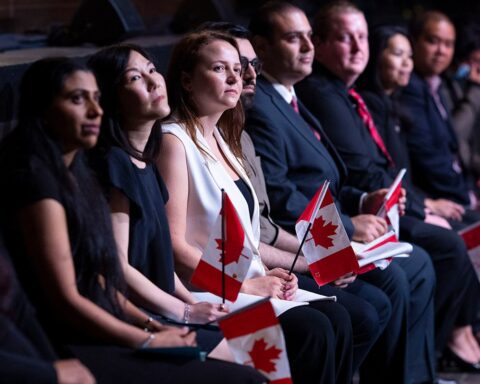Conservative Leader Andrew Scheer introduced a handful of new policy ideas during the nine month long leadership race, but Tory strategists suggest they likely won’t be part of the Tories 2019 election platform.
Scheer has vowed to take away federal funding from universities that don’t defend free speech. He’s proposed displaying the flags of countries that export oil to Canada on gas pumps. Scheer, who sends his own children to a faith-based school, has proposed a tax break for parents who home-school their children or send them to independent schools. He also suggested in an interview with a community newspaper that he would axe CBC’s news division.
Conservative strategist and vice chair of Summa Strategies Tim Powers said he would be surprised if more than 20 per cent of Scheer’s ideas became a part of the Conservative party’s 2019 platform.
Powers said Scheer’s proposal to de-fund universities that don’t protect free speech could be an election promise — because that idea has appealed to more than just Conservatives — but he called the flags on gas pumps idea “gimmicky.”
Powers said he thinks that Scheer’s tax credit for home-schooled families and for families who send their children to faith-based schools likely would present problems for him because his opponents will say he’s beholden to certain faith groups.
Keith Beardsley, a longtime Conservative strategist and former deputy chief of staff to Stephen Harper, said Scheer’s policies are easy to implement, but … “Stickers on gas pumps? I doubt many motorists will give a damn. Raise the prices and you have a problem.”
Beardsley said a tax credit for homeschooling or faith-based schools could be opening up a can of worms. “Which faiths? How much will it cost the government when Scheer promises to balance the books?”
Beardsley said that while attacking the CBC is popular among Conservatives and makes for good rhetoric, it’s not practical.
“[Scheer] said he wasn’t going to present anything in 2017 that he wouldn’t run on in 2019,” said Nancy Bishay, a spokesperson for Scheer.
“There are many interesting proposals he put forward and he’ll work together with the caucus, and also through the grassroots conservative policy process, to put together a platform to present to Canadians in 2019,” said Bishay.
Scheer’s ideas will have to be taken under consideration at the Conservative party’s policy conference in Halifax next year. But since he has championed a few very specific policies, delegates likely will support his wishes, said Susan Elliott, a Conservative strategist and partner at Strategy Portal.
But Elliott, who favoured Michael Chong for the leadership, suggested that the Conservative party is still going to have a hard time appealing to millennials in the 2019 election — by which time, she said, they will have become the largest single voting bloc, surpassing the baby boomers.
“I personally don’t think millennials will find those issues motivating. I just don’t think they are high on their top issues of concern,” said Elliott of Scheer’s ideas, specifically tax credits for home-school or faith-based schooling, and taking funding away from universities that don’t protect free speech.
“Millennials will want a credible climate change plan. A revenue-neutral carbon tax – also eliminating cumbersome regulations and directives – is the most cost-effective and conservative way to achieve that, but both party members and the new leader rejected that proposal.”
Powers said Scheer likely will “beg, borrow and steal” ideas from other candidates — but that Chong’s carbon pricing idea won’t be one of them.
Elliott said millennials don’t want to reopen debates on social issues like women’s reproductive rights and equal rights for LGBTQ citizens. In fact, said Elliott, “they don’t even understand why those are debates.”
She said political hostility towards people of diverse backgrounds and contrary points of view is a foreign concept to most millennials — but it was front and centre during the CPC leadership race “in a way that would not attract millennials to our party.”
“We must trust Andrew Scheer, now that he has been chosen to lead, to understand these truths about the current electorate. I believe he is a smart man,” she said.
Elliott said she thinks Scheer will show wisdom in adopting “millennial-friendly policies” and convincing the party and caucus to come along.
“What did Trudeau campaign on in his leadership race in 2013 that became Liberal policy?” said Powers. “It’s hard to recall because it’s not often policy that determines who wins leadership races.”
By arrangement with iPolitics.ca




